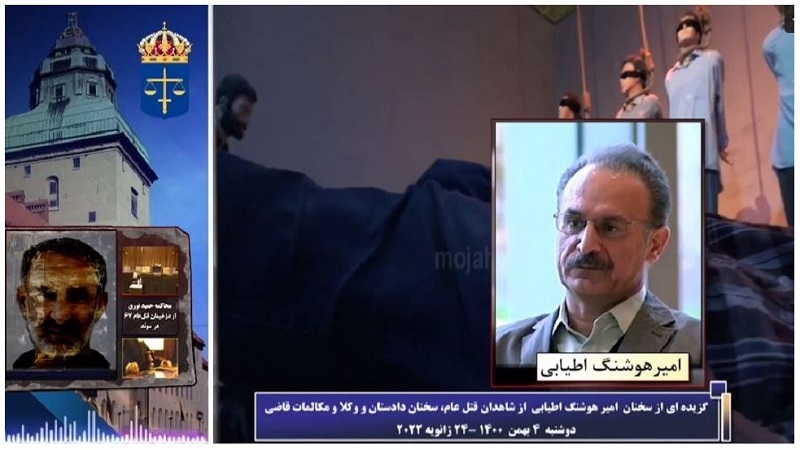
On Monday, January 24, the sixty-first session of the trial of one of the Iranian regime’s henchmen Hamid Noury, took place in Sweden, with yet another former Iranian political prisoner testifying during the session to give an eyewitness account of his experiences during the 1988 massacre in Iran.
Hamid Noury, a former prison official, was arrested in 2019 on a trip to the Scandinavian country for his role in the massacre of over 30,000 political prisoners in the summer of 1988. The majority of prisoners who lost their lives were members and supporters of the regime’s opposition group, the People’s Mojahedin Organization of Iran (PMOI/MEK).
Giving a testimony in this session of the trial was Amir Houshang Atyabi, a former Iranian political prisoner who was imprisoned at Gohardasht prison at the time of the massacre.
The National Council of Resistance of Iran (NCRI) said, “Atyabi was arrested in 1983 for supporting the Tudeh (Communist) Party of Iran after the group was banned from political activities in Iran.”
Atyabi told the court, “Immediately after my arrest, I was taken to ward 209 of Evin prison and tortured until dawn. I spent a year and a half in prison before being sentenced. They ultimately sentenced me to 10 years in prison.”
He described the scene of guards taking the bodies of executed prisoners away from the prison in large, heavy load trucks, that had been pulled up beside Hosseinieh, the large hall in the prisoner where the executions took place in groups of 10 to 12 prisoners at any one time.
He said, “That day, I saw the most horrible scene in my life that still haunts me to this day. Through the window, I saw the two guards going on the top of the truck. I could clearly see them moving something to free up some space. Suddenly, I realized they were moving bodies. They were holding to limbs of dead bodies, moving them around.”
The 1988 massacre began in late July of that year, following the issue of a fatwa by the regime’s then-Supreme Leader Ruhollah Khomeini, which ordered the executions of any prisoners who opposed the regime’s fundamentalist theocracy.
The NCRI said, “The so-called ‘Death Commissions’, consisting of four officials, were tasked with implementing Khomeini’s order. The Iranian regime’s current president, Ebrahim Raisi, was a member of Tehran and Karaj’s death committee.”
During the minutes-long trials in the ‘Death Commissions’, prisoners were posed with one question, whether they still supported the MEK. Those who stood steadfast in their support of the opposition group were immediately sent to the gallows and hanged. Noury was among the prisoner officials at Gohardasht who escorted the prisoners to their deaths, and was also known to have tortured and harassed many prisoners during his employment there.
Atyabi explained, “Whenever we went to the prison yard, we could hear other prisoners’ cries under torture and the sound of flogging. These voices paralyzed us. Once I heard two prisoners who cried ‘henchmen, stop!’”
He also described how prisoners even resorted to committing suicide to escape the regime’s inhumane torture, adding, “Another terrible incident was the suicide of a prisoner. We suddenly saw a prisoner jumping out of the window. We were wondering how he did this. We couldn’t understand whether he attempted to break from prison or he committed suicide.”
The NCRI said, “On Monday, simultaneous with Noury’s trial, the MEK supporters and family members of victims continued their rally outside the courthouse. They urged the international community to hold the Iranian regime and its criminal leaders like Raisi accountable. It is worth noting that the court proceeding was transferred to Albania in November on the orders of the judge so that the MEK members residing at Ashraf 3 could testify.”